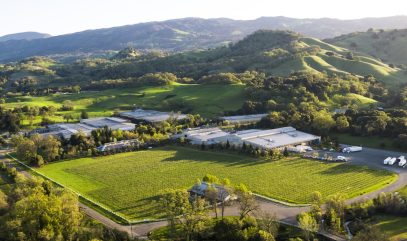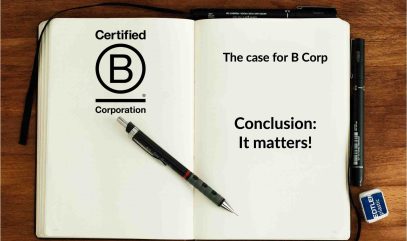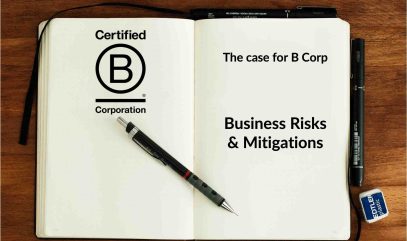The 2019 State of Green Business
Every year, Green Biz Group puts out a report highlighting the current trends in green business, and the 2019 report was recently released. As the authors reflect back to their report a decade ago, they notice a striking similarity between the state of green business today. They describe this feeling as one of both "bright hope and dark uncertainty." In their 2009 report they wrote,
"This year’s update is a mixed bag of encouraging and discouraging news. But on balance, despite a growing chorus of corporate commitments and actions, we’re less optimistic that these activities, in aggregate, are addressing planetary problems at sufficient scale and speed."
Ten years ago, the uncertainty was primarily due to a great global recession, and the hope came in the form of a new government promising green jobs and investments in renewable energy. Today it's another regime change, but this time our elected leaders are removing policies to protect our natural resources while investing in more fossil fuel production. The bright hope today takes the form of businesses and local governments stepping up to the challenge of reimagining sustainable strategies that promote innovation, engage stakeholders, and meet global standards for science-based targets.
The 2019 GreenBiz report is well worth the read if you have time. Otherwise, consider my summary below a worthy alternative!
The Ten Trends for 2019
- The Corporate Social Responsibility Profession Gets Specific -- CSR is moving from its traditional roots in PR and risk management, toward a more integrated strategic initiative. Sustainability professionals are becoming more innovative and using the company's assets to drive new technologies and create more opportunities that are driving down carbon emissions, conserving natural resources, and creating a multi-stakeholder partnership in an effort to create greater impact.
- Reuse Makes a Comeback -- The first of the three Rs is getting more attention these days. In an effort to close the loop on waste, companies like Loop are finding new ways to manage hard to recycle packaging. Loop is teaming up with big brands like Proctor and Gamble and Ben & Jerry's to ship their products in reusable packaging. Spokane's own Roast House Coffee is packaging their product in partnership with TerraCycle, and they encourage customers to reuse their durable coffee bags at the grocery. Patagonia has successfully promoted reuse for years by encouraging their consumers to repair outdoor gear before buying new.
- Soil Becomes Fertile Ground For Climate Action -- Food and agricultural companies are feeling the impacts of decades-old farming practices that optimized yield over land stewardship. From small to large, farmers and food executives are better understanding the benefits of proper land management practices. In 2016, General Mills partnered with The Nature Conservancy to develop a "healthy soil roadmap" for US agriculture. Beth Robinette of the Lazy R Ranch, located in Cheney, WA, is using technology to manage her cattle's grazing patterns. They "use livestock to improve soil health, increase carbon sequestration, and decrease desertification." Their successful land management efforts are highlighted here in this NY Times article: Female Farmers Are Reclaiming the American West.
- Corporate Action Takes Root on Deforestation -- According to Global Forrest Watch, tree cover loss has been increasing at an alarming rate over the past decade. 2017 was the second worst year on record for tropical tree cover loss. It is estimated that 8 percent of the annual global GHG emissions is due to the loss of tropical forests, which release trapped gases when trees are cut down. Forests, including those in the Pacific Northwest, are also threatened by fires that are increasing in frequency and intensity. Companies like ForestMapper and NGO's like Global Forrest Watch, are creating tools for businesses to use to track the impact their supply chains have on deforestation.
- Electric Buses and Trucks Charge Ahead -- From China, to Poland, to Park City, UT school and public transportation authorities are moving toward an all electric fleet. In part due to the Volkswagen emissions scandal, the Spokane Transit Authority is adding electric busses to their new central city line. Though the trends are moving in the right directions, many challenges still exist in the manufacturing of these electric vehicles which will need to be resolved before large scale implementation is possible.
- Companies Double Down on Energy Production -- From the GreenBiz report: "It’s well established that using less energy doesn’t have to come at the expense of economic growth. But why settle for seeking the same results with less power — the hallmark of efficiency programs — when the real jackpot could be increased sales or higher levels of productivity by prioritizing low-carbon energy management?" From transitioning to LED lighting to implementing smart technology, companies are innovating ways to be more productive using less energy.
- Green Loans Promise a Lower Cost of Capital -- The growth of sustainability loans (lower rate loans tied to a company's environmental, social, and governance (ESG) performance) are becoming more readily available. This trend can be a game-changer for companies of all sizes. Unlike green bonds, green loans allow sustainable businesses to use the funds for unrestricted purposes, as long as the company reports back on their ESG performance. Some green loans, however, are tied to specific impacts, for example, GHG emissions. The caveat here is that CEOs and business managers will need to be able to put their financial performance into context of their ESG performance. Not a bad trend if it incentivizes more thoughtful measurement of impacts!
- Super Pollutants Become Super Important -- Super pollutants are pollutants that are exponentially more powerful than carbon dioxide even though their lifecycle is generally a lot shorter than CO2. Examples are methane, black soot, CFCs & HFCs. Due to their "potency" the elimination of these pollutants are much more urgent than focusing on carbon dioxide alone.
- Climate-Risk Disclosure Takes Investors by Storm -- Big shots in the investment industry, like BlackRock's Larry Fink, are bringing attention to the fact that impact investment has a role to play when it comes to climate change. Financial performance reporting over the past several years has shown that sustainable businesses are outperforming their less sustainable competitors. According to the 2015 Nielsen Global Survey of Corporate Social Responsibility and Sustainability, sales of consumer goods from brands with a demonstrated commitment to sustainability grew 4%, while those without grew less than 1%.
- Science Based Targets Look Beyond Carbon -- In the fall of 2018, a group of approximately 25 organizations, primarily NGOs, came together to form the Science-Based Target Network in order to set goals for reductions and protections of climate impacts other than CO2: water, land use, biodiversity, oceans, etc. As our climate grows warmer, and resources become more stressed due to a growing population, action to protect our water in particular will become essential to the survival of the human race. According to a 2014 UN Water Development Report, it is estimated that global water demand will increase by 55 percent by 2050, and more than 40 percent of the global population will be living in areas of severe water stress. In Spokane, a team of local hydrologists, policy makers, business leaders, environmentalists and nonprofit leaders are working with the Northwest Climate Impact Research Consortium (CIRC) to use climate data to predict the impact of climate change on our local water system. More information on their work can be found here.
Read More
B Corps Take Climate Justice Seriously
When B Lab launched the Climate Justice Playbook for business, the B Corp community was excited. Companies understood the principles, and wanted more examples of companies implementing climate justice initiatives. The id
Case for B Corp: A Primer (Part 1)
There is strong consumer demand for products produced by companies they deem to be responsible and focused on social and environmental sustainability. In many cases, consumers will pay more for those products. Employees
Case for B Corp: It matters (Part 10)
We know that the climate is changing – 97 percent of scientists agree. While social problems are not new and have been transparent to many people, Covid-19 and racial justice protests shine a bright light on the challeng
Case for B Corp: Business Risks and Mitigations (Part 9)
Risk exists in every decision we make and every action we take as individuals. There are few things in life that don’t carry some risk. Businesses are no different – they face risks every day. And while becoming a B Corp




